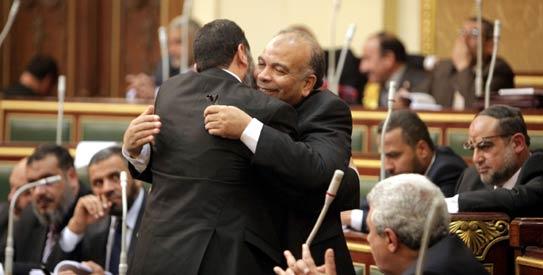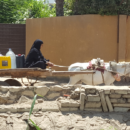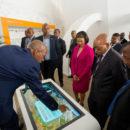Egypt: revolution risks being captured by Islamists – By Adel Darwish

On Monday 23 January 2012, the Egyptian parliament elected the first Islamist speaker in its 188 year history. One Islamist member added his own “˜conditions’ to the traditional oath of allegiance to the nation, its constitution and laws, adding “as long as they don’t contradict Allah’s laws”. It was evident that not all Islamists, accused by liberals and nationalists of “˜pretending’ to accept parliamentarian democracy as means to an end, can manage to stick to the script until the end of act one. Many people fear that once Islamists gain full control they will pass a constitution reversing Egypt’s way of life and turn the country into an Iranian style Islamic republic.
Concurrently, in what appears to be a slow reversal of fortunes, the very conservative Saudi society seems to be slowly but steadily benefiting, in an indirect way, from the revolutions that swept Tunisia, Egypt, Libya, Yemen and Syria. Even though there has been no mass protest in Saudi Arabia, King Abdullah has been bringing reforms and ushering, modest, but effective steps to modernise Saudi Arabia’s conservative society. In contrast, the most remarkable of all revolutions, the Lotus revolution, sparked in Tahrir Square on January 25th last year, has an uncertain future as the voters, seduced by some meaningless slogans about Islamic values, have replaced Mubarak’s dictatorship with a backward-looking totalitarian regime.
The first anniversary of events which triggered the revolutions still sweeping North Africa and the Middle East was marked by an irony summarised by an Egyptian feminist:
“˜”˜Two different Saudi and Egyptian time-trains, slowly passing each other on a line called women’s history,” the female columnist opined on a move by King Abdullah bin Abdul Aziz of Saudi Arabia, which, a year ago was beyond the dreams of the most optimistic of Saudi reformists. Last week the Saudi king sacked the hard-line chief of morality (religious) police who roam the kingdom’s shopping malls and streets enforcing a rigorous version of Islamic law among the 27 million residents of the country. They often lash women with long thin bamboo sticks for showing hair, or having a short dress. Wanting to curb such excesses, King Abdullah replaced the hard-line Sheik Abdulaziz al-Humain with a more the more liberal cleric Sheik Abdulatif al-Sheikh.
In his role as senior member of the Council of Senior Scholars, one of the two highest religious authorities in the kingdom, Mr al-Sheikh opposes child marriage and defends Saudi women’s rights under Islam to work and to mix with men in public places.
In the same week that Saudi women welcomed this news, their Egyptian sisters were protesting against intimidation by far-right Islamists. A self styled vigilante Salafi group announced receiving 1000 Tasers (causing incapacitating electric shock ) for their patrols to use enforcing “˜modesty and Islamic code’ on Egypt’s streets. The Salafi vigilantes call themselves amr beilmarouf walnahi an al munker – “Promotion of Virtue and Prevention of Vice”. The same name used by the Saudi modesty police.
In response to the 2011 revolutions, most of the Arab monarchies accelerated economic and political reforms wider than those demanded by their population. King Abdullah seized the opportunity to push through further reforms, for example, appointing women to a consultative council (called Shura) which would be the base of a future parliament. Unlike almost all of the region’s military coup-based republics, the legitimacy of Arab monarchies was not challenged.
The constitutional ambiguity of dictatorial republics will lead to ongoing instability, or worse, allow groups, labelled by the liberals who started the revolutions as “˜medieval and unenlightened forces’ to kidnap these embryonic democracies.
The rise of Salafis (who reject modernity, secular education and forbid individual Muslims from thinking outside the Salafi 13th century interpretation of Islamic teaching) alarm women, whom Salafi literature describe as “˜of lesser [than men] in faith and mind’. In November, Muna Saleh, a female candidate of the Salafi political party Alnour (ironically meaning “˜light’; which came as a gift to stand-up comedians) contesting Egyptian parliamentary election, substituted her own photograph with that of her husband’s on publicity posters.
It wasn’t clear whether it was the husband’s looks or Ms Saleh’s own rhetoric that was behind her disastrous results as she lost her deposit. “˜”˜It’s anti-Islamic and anti-social for females to be photographed,” she explained to female journalists, while dressed in full niqab (tent like burkah) stating that women weren’t mentally equipped to hold office.
The Salafis won over one fifth (125 out of 498) of the lower house seats, while the more sinister and politically savvy Muslim Brothers, disguised as the Freedom and Justice Party (FJP), won 47 percent (235 seats). However, political scientist Dr Mamoun Fandy of the London Global Strategy Institute (LGSI) says it was illegal for both Alnour and FJP to contest the election. Electoral law based on article four of the interim constitution (1971 amended by the March 2011 referendum) prohibits religious groups from participating in political elections.
The Supreme Council of Armed Forces (SCAF), which removed President Hosny Mubarak in a coup, seen by Egyptian liberals as high-jacking their Revolution, has turned a blind eye on this breaching of electoral law.
When two powerful SCAF generals were asked by British parliamentarians last week in London whether they preferred a return to the pre-1952 coup Westminster-style Parliamentary system, or a Turkish model with supra-constitutional powers for military, they replied “Neither,” preferring the “French system.”
The military would like to contain the full parliamentary democracy demanded by Tahrir Square revolutionaries within a powerful presidential system, by following the tradition set by the unconstitutional 1952 military coup which established Colonel Nasser’s Stalinist one party military-backed dictatorship. Before the army take-over, the abolition of the constitution in 1954 and suspension of parliament, the prime minister and all his cabinet members were elected MPs – the King inviting the leader of the majority to form the government. The tradition started in 1878 when the office of Prime Minister was created. The 1923 constitution introduced Westminster traditions where all cabinet members are elected politicians, while elected ministers controlled military, security, intelligence and police.
The “˜ French-style’ system to which the Egyptian generals referred, means they want an elected prime minister to appoint elected MPs as ministers in his cabinet, but security, defence and intelligence ministers to be appointed by a president controlled by SCAF. It is more likely they will end up with a Pakistan model: a backward, anti-women, anti-liberal, fundamentalist socio-political Taliban-like “˜elected’ totalitarian government with a president backed by a privileged unaccountable military ready to step-in and rebalance the status quo if needed. Western democracies seem content with the prospect. America, the EU and Britain responded to SCAF security forces ransacking offices of dozens of NGOs they sponsor to promote democracy and human-rights, with muted feeble words. In contrast, internationally and nationally respected former International Atomic Energy chief Dr Mohammed El-Baradaei, who was among the first on the streets during the revolution, pulled out of the presidential race protesting against a “lack of democracy.”
The election by the Egyptian Parliament of its first Islamist speaker in its188 year history followed a raucous debate about whether candidates for the post should be allowed to address the chamber beforehand. This speaks volumes about the new Islamist-dominated chamber’s misunderstanding of democracy, and their lack of knowledge of their own history. Before the 1952 coup, Egypt’s parliament followed roughly similar rules and traditions as those of Westminster – the memory of which seems lost among the contemporary political class in Egypt.
Adel Darwish is a veteran Fleet Street foreign correspondent and has written for The Daily Telegraph and The Independent.





